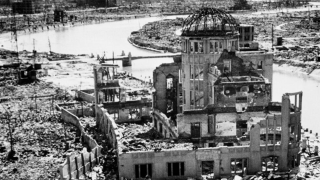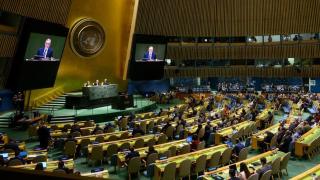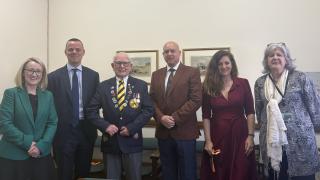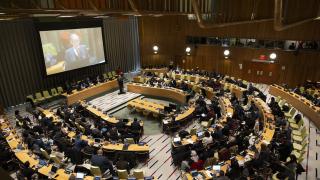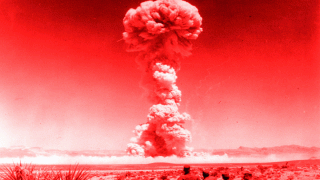
NUCLEAR DISARMAMENT
UNA-UK works for a world free of nuclear weapons and calls on the UK to uphold its international obligations
Britain’s failure to live up to its disarmament commitment and its dismissive approach to the Ban Treaty is contributing to a deterioration in nuclear security.
The existence of nuclear weapons represents an inherent and existential risk to humanity but in an environment of faltering faith in the international system – in part a symptom of big-power tensions – that risk is increasing. UN analysis reinforces this and places primary responsibility for reducing this risk with those states armed with nuclear weapons. This threat, which concerns all humanity, will remain for as long as nuclear weapons continue to exist in national arsenals
The 1968 Treaty on the Non-Proliferation of Nuclear Weapons (NPT) has kept the number of states with nuclear weapons in single figures. At its heart is a bargain: 183 non-nuclear states are prohibited from developing nuclear weapons; in exchange, the five recognised nuclear-armed (N5) states (China, France, Russia, US and UK) are committed to taking steps towards multilateral disarmament. With the N5 not holding up their side of the bargain, the NPT regime looks in jeopardy.
In 2016, the UK decided to replace its nuclear missile system for an estimated £160 billion plus. In 2018 the UK struck a further blow to the NPT when a Government minister ‘welcomed’ the US’s controversial Nuclear Posture Review, which could make use of a nuclear weapon more likely.
Recently the UK has repeatedly failed to even participate in significant international disarmament discussions, most notably, the Treaty on the Prohibition of Nuclear Weapons (TPNW), negotiated by 122 states in 2017. Instead, Britain attacked the process from the outside, at times literally: in March 2017, the UK ambassador joined his US counterpart in protesting the initiative by standing outside the negotiating room while the Pope and Hiroshima survivors addressed delegates on the need for a world free of nuclear weapons.
The UK should adopt a constructive approach towards the TPNW and acknowledge it as a legitimate part of the rules-based international system. Within this approach, the UK should:
- Announce the intention to attend any future Meeting of States Parties of the TPNW as an observer, to follow developments and avoid misconceptions;
- Provide technical expertise and other input within the TPNW framework where relevant, for example on: discussions of verification issues that will take place and on which the UK continues to do substantial work; and on activities to address ongoing human and environmental harm from past nuclear testing;
- Until such time that it becomes a State Party of the TPNW, voluntarily implement Article 6 of the TPNW on victim assistance and environmental remediation and publish details of actions taken;
- Foster a dialogue with countries and organisations working on the TPNW on how the Treaty can make an effective contribution to disarmament, including through making a positive, reinforcing impact on the disarmament pillar of the NPT.
The UK should make concrete progress on its Article 6 NPT commitment to by taking unilateral steps to disarm including the following which compatible with the manifesto commitments of all major UK political parties, inter alia:
- Explore further reductions in overall numbers of nuclear warheads;
- Adopt unambiguous polity of no first use;
- Strengthen negative security assurances to states without nuclear weapons;
- Plan for a denuclearised UK security policy by instructing the MOD to make alternative security arrangements that would allow the UK at some point in the future to transition to a nuclear-free national security strategy.

